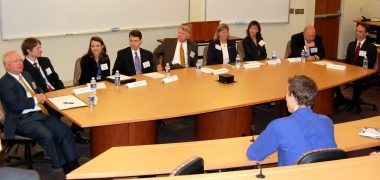Elon Law's Career Services office, along with the law school's Moot Court Board, sponsored a Post-Graduate Judicial Clerkship Panel at the law school on April 14. At the event, judges shared with students the qualities and expectations of their law clerks and what they like to see in clerkship applications. Current law clerks shared with the audience a typical day in their lives and important tips for preparing clerkship applications.

The panel included judges from the United States District Court for the Middle District of North Carolina, the North Carolina Supreme Court and the North Carolina Court of Appeals.
The Honorable Jim Exum moderated the event. Exum served on the North Carolina Supreme Court from 1974 to 1994, and was Chief Justice from 1986 to 1994. He serves as Distinguished Jurist in Residence at Elon Law and is a founding member of the Elon University Law School Advisory Board.
Carrie Johnston, L’12, said the forum was insightful.
“I attended the panel discussion to learn more about clerkships in general,” Johnston said. “I especially wanted to know what characteristics judges look for when selecting clerks. The judges were very candid in their responses to questions, and, as a result, I left the discussion with some concrete ideas for making an application stand out.”
Panelists at the event were: The Hon. William L. Osteen, Jr., U.S. District Judge for the Middle District of North Carolina, The Hon. Robin Hudson, Associate Justice of the North Carolina Supreme Court, The Hon. Robert N. Hunter, Jr., Judge of the North Carolina Court of Appeals, Edward Garrett, Esq., L’10, law clerk to Judge Hunter, Amanda Lacoff, Esq., law clerk to Justice Hudson, Keith McCrickard, Esq., law clerk to Judge Catherine C. Eagles, United States District Court, Middle District of North Carolina, Missy Speir, Esq., law clerk to Judge Osteen, and Stephen Thill, Esq., law clerk to Judge Osteen.
By Danielle Appelman, L’12


